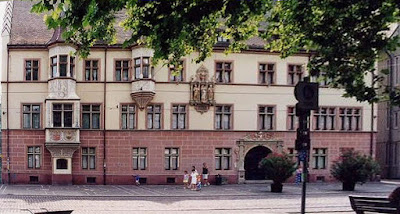Some people still claim that Napoleon - being blamed for everything* - coined the word when he - on his way to Hamburg, capital of the then French Département de bouche de l'Elbe - stayed for lunch at a small Westphalian village. The local peasants offered him the local black bread. The emperor took it in his hands, took a smell, and is claimed to have said, "Bon pour Nickel," pointing to his horse named Nickel.
*According to the German playwright and filmmaker Curt Goetz: Napoleon ist an allem Schuld (Napoleon Is to Blame for Everything)
The peasants did not quite understand what Napoleon meant and would have been annoyed by his statement that their bread was only good for horses. However, the imperial words pleased them, so they called their dark bread pumpernickel from now on.
The story is a hoax. It was the papal nuncio Fabio Chigi who first mentioned pumpernickel. In 1644, on his way to Münster, when he attended the Westphalian Peace negotiations, he lunched at the Wittlerbaum Inn at Bocholt. Afterward, Chigi summarized his experience: "The people of Westphalia call their dark bread pompernickel, an almost inhumane food even for peasants and beggars."
In 1792, the Duke of Weimar ordered his prime minister Goethe to accompany him as an embedded reporter during the campaign of the Princes' Alliance against the French Revolutionary Army. In France, the poet felt captured in a bad dream zwischen Koth und Noth, Mangel und Sorge, Gefahr und Qual, zwischen Trümmern, Leichen, Äsern und Scheishaufen (between shit and misery, lack and sorrow, danger and anguish, between rubble, corpses, graves, and turds). Eventually, Goethe became depressed when the Alliance suffered a defeat against the French Republic at Valmy, and the troops had to retire. In his later years, describing his Campaign in France, he writes the following story about pumpernickel:
On his way home from the campaign, Goethe passed through Westphalia, where the streets were full of aristocratic French refugees. The local population did not like the foreigners who had kept their arrogance and immodesty despite their humiliation and threatening poverty.
While resting at a rural inn, Goethe noticed a modest young Frenchman obviously underway on foot eating his frugal meal and that, when he paid, the landlord cut his bill in half. When Goethe asked why, the landlord explained, "He is the first of these blasted people who has eaten pumpernickel. He had to benefit from it."
In southern Germany, pumpernickel is sold in supermarkets thinly sliced and packaged.
 |
| Does he prefer the dark pumpernickel to the blond girl? |
*Westphalian and Black Forest hams are too salty
*



















